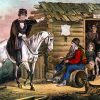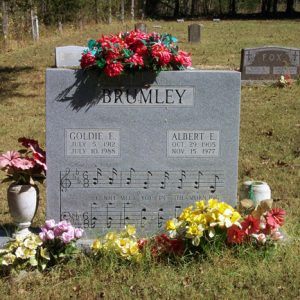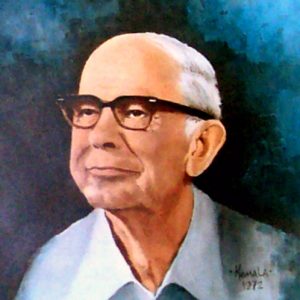calsfoundation@cals.org
Albert Edward Brumley (1905–1977)
Albert Edward Brumley Sr. was one of the most successful American gospel song composers of the twentieth century, penning such standards as “I’ll Fly Away,” “I’ll Meet You in the Morning,” “If We Never Meet Again,” “Turn Your Radio On,” and many others. Between 1926 and 1931, he studied, lived, and worked at the Hartford Music Company in Hartford (Sebastian County) under the tutelage of its founder, Eugene Monroe (E. M.) Bartlett. Although Bartlett died in 1941, Brumley forever credited him as the chief mentor and inspiration behind his music and eventually purchased the Hartford Music Company in 1948.
Albert E. Brumley was born on October 29, 1905, in Indian Territory near present-day Spiro, Oklahoma. His parents, William Sherman Brumley and Sarah Isabelle Williams Brumley, were recent newcomers to the region, sharecropping cotton until they finally had enough money to buy their own farm outside nearby Rock Island, Oklahoma. The middle child of three boys, Brumley was five years old when his older brother, Bill, died of typhoid fever.
Music, both sacred and secular, formed an important part of Brumley’s childhood. His parents were firmly committed Campbellite Protestants, but his father was also a noted fiddler, and his mother enjoyed singing parlor songs. Music was integral to the family’s weekly church gatherings and house parties. Brumley completed public school in Rock Island through the tenth grade, and participation in his first shape-note singing school there, at age sixteen, ignited his lifelong passion for gospel music.
At age twenty, Brumley arrived virtually penniless on the doorstep of E. M. Bartlett, hoping to enroll at the renowned publisher’s Hartford Music Institute. Bartlett graciously took the young man under his wing, even providing board at his own home. Bartlett’s kindness paid off; Brumley published his first song for Hartford in 1927 (“I Can Hear Them Singing Over There”) and eventually became one of Bartlett’s finest staff songwriters. He also sang bass with the 1929 Hartford Quartet and became increasingly active as a singing-school teacher in the Oklahoma-Missouri-Arkansas tri-state area.
In 1931, Brumley married Goldie Schell and moved to Powell, Missouri, where he lived for the rest of his life and raised his six children. He continued working for Bartlett on part-time and freelance bases, and a string of successful songs published in the 1930s—mostly by Hartford and including “I’ll Fly Away” (1932)—emboldened Brumley to try composing full time. By the early 1940s, he was earning $200 a month as a staff songwriter for the famous Stamps-Baxter Music Company in Dallas, Texas. In 1943, Brumley started his own publishing company, Albert E. Brumley and Sons, and he purchased the Hartford Music Company in 1948, acquiring the copyright to several of his most successful songs. Today, Albert E. Brumley and Sons/Hartford Music Company continues to operate in Powell under the direction of Brumley’s son Robert.
In 1969, Brumley began the Sundown to Sunup Gospel Sing, which was held annually in Springdale (Washington and Benton counties) until 2001 and then in Fayetteville (Washington County) until 2005. It continued in Lebanon, Missouri, in 2006 as a four-day festival called the Albert E. Brumley Memorial Gospel Music Sing and now takes place in Tulsa, Oklahoma, under the name Brumley Gospel Sing.
Thanks to their widespread use among early radio and recording artists, several of Brumley’s songs became extremely popular among the general public. “I’ll Fly Away” alone has been recorded thousands of times and continues to be successful. Recent recordings include artists as diverse as Aretha Franklin, Alan Jackson, and Kanye West, as well as an appearance on the platinum-selling soundtrack for the film O Brother, Where Art Thou? (2000).
Albert E. Brumley died on November 15, 1977, and is buried in the Fox Cemetery just outside of Powell. Estimates of his total output range from 600 to 800 songs.
For additional information:
Deller, David Charles. “Sing Me Home to Gloryland: Arkansas Songbook Gospel Music in the Twentieth Century.” PhD diss., University of Arkansas, 1999.
Goff, James R., Jr. Close Harmony: A History of Southern Gospel. Chapel Hill: University of North Carolina Press, 2002.
Hively, Kay, and Albert E. Brumley Jr. I’ll Fly Away: The Life Story of Albert E. Brumley. Branson, MO: Mountaineer Books, 1990.
Malone, Bill C. “Albert E. Brumley: Folk Composer.” Bluegrass Unlimited 21 (July 1986): 69–77.
Stubblefield, Paul. “Brumley is Ozark’s Country/Gospel Songmaster.” Music City News 14, no. 10 (1977): 25, 40.
Wolfe, Charles K. “‘I’d Rather Be An Old-Time Christian’: The Music of Albert E. Brumley.” Precious Memories (May–June 1991): 15–18.
Kevin D. Kehrberg
University of Kentucky










My dad, Ray Jones, was a prodigy gospel piano player and attended the Stamps Baxter music school in Dallas in the early 1940s when Mr. Brumley was on staff. It has become a family tradition to sing “I’ll Fly Away” at any family gathering especially funerals, of which there are far too many. Dad is now ninety-one though and doing great.